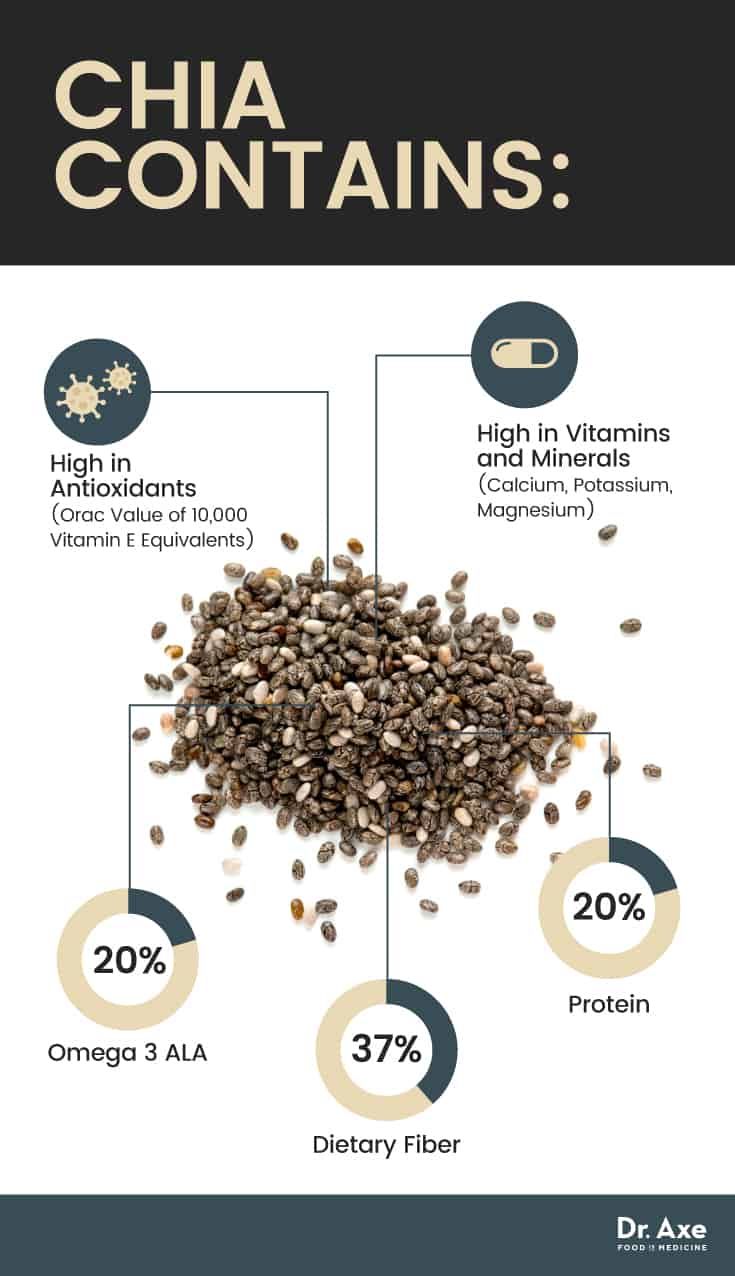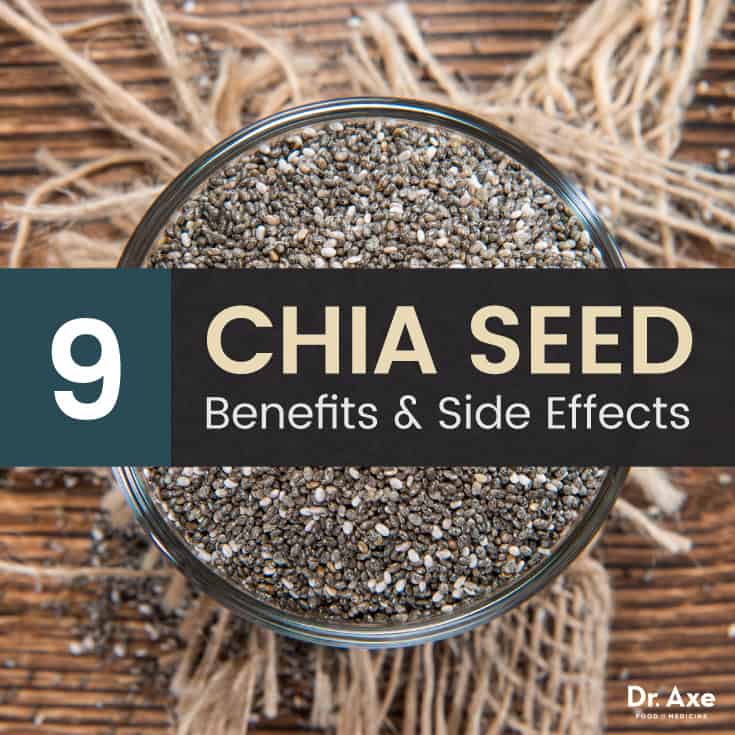9 Chia Seeds Benefits + Side Effects
Chia seeds (salvia hispanica) have become one of the most popular superfoods in the health community. They’re easy to digest when prepared properly and a very versatile ingredient that adds easily to recipes. Plus, chia seeds benefits are plentiful.
Originally grown in Mexico, the seeds were highly valued for their medicinal properties and nutritional value. In fact, they were even used as currency.
The chia seed is nutrient-dense and packs a punch of energy-boosting power. Aztec warriors ate chia seeds to give them high energy and endurance. They said just one spoonful of chia could sustain them for 24 hours. Chia means “strength” in the Mayan language, and chia seeds were known as “runners’ food” because runners and warriors would use them as fuel while running long distances or during battle.
Not only that, but recent research has found that the chia seeds benefits are even greater than we realized. Chia seeds benefits include promoting healthy skin, reducing signs of aging, supporting the heart and digestive system, building stronger bones and muscles, and more. They’ve even been linked to helping reverse diabetes. Continue reading for possible side effects, preparation instructions and a complete list of chia seeds benefits and nutrients.
Chia Seed Nutrition Profile
The reason chia seeds are so beneficial is due to them being rich in fiber, omega-3 fats, protein, vitamins and minerals.
For example, one ounce (28 grams) of chia seeds contain about:
- 137 calories
- 12.3 grams carbohydrates
- 4.4 grams protein
- 8.6 grams fat
- 10.6 grams fiber
- 0.6 milligram manganese (30 percent DV)
- 265 milligrams phosphorus (27 percent DV)
- 177 milligrams calcium (18 percent DV)
- 1 milligram zinc (7 percent DV)
- 0.1 milligram copper (3 percent DV)
- 44.8 milligrams potassium (1 percent DV)
Chia seeds also contain essential fatty acids alpha-linolenic and linoleic acid; mucin; strontium’ vitamins A, B, E and D; and minerals, including sulphur, iron, iodine, magnesium, manganese, niacin and thiamine; and they’re a rich source of antioxidants.

Top 9 Chia Seeds Benefits
Being rich in so many key nutrients, research has uncovered that regularly eating chia seeds can improve your health in numerous ways. Some of the top chia seeds benefits are:
1. Skin and Aging
Researchers from Mexico uncovered that chia seeds had a total natural phenolic (antioxidants) concentration nearly two times higher than previously reported, and the antioxidant activity was shown to stop up to 70 percent of free radical activity.
This research essentially proves that chia seeds are one of nature’s riches high-antioxidant foods. Antioxidants speed up the skin’s repair systems and prevent further damage. Taking chia seeds can prevent premature skin aging due to inflammation and free radical damage.
2. Digestive Health
Chia is super-high in fiber, providing nearly 11 grams per ounce. One serving can provide the recommended fiber intake for the day, according to the American Dietetic Association.
Fiber is essential for your body’s ability to balance insulin levels. According to the National Institutes of Health, seeds like flax and chia can be a natural blood sugar balancer due to their high fiber content and healthy fats.
Being high in dietary fiber, chia seeds benefits bowel regularity and healthy stool. The rich fiber content in chia seeds also helps people feel more full quicker because it absorbs a considerable amount of water and immediately expands in the stomach when eaten. This may explain why clinical studies have proved that chia curbs hunger and suppresses appetite, which can also lead to weight loss.
Also when consumed, chia seeds create a gelatin-like substance in the stomach. This gel-forming action is due to the soluble fiber in chia seeds, and it can work as a prebioticthat supports the growth of probiotics in the gut.
3. Heart Health
Chia seeds’ ability to reverse inflammation, regulate cholesterol and lower blood pressure make it extremely beneficial to consume for heart health. Also, by reversing oxidative stress, someone is less likely to develop atherosclerosis when he or she regularly consumes chia seeds.
In a nutshell, according to research out of Massachusetts:
The available human and non-human studies show possible effectiveness for allergies, angina, athletic performance enhancement, cancer, coronary heart disease (CHD), heart attack, hormonal/endocrine disorders, hyperlipidemia, hypertension, stroke, and vasodilatation. Some evidence also suggests possible anticoagulant, antioxidant, and antiviral effects of Salvia hispanica.
Chia seeds (salvia hispanica) are high in linoleic acid, a fatty acid that helps the body absorb fat-soluble vitamins A, D, E and K. For such a tiny seed, chia is quite high in healthy fats, boasting more omega-3s than salmon. Omega-3s work to protect the heart by lowering blood pressure, bad cholesterol and inflammation. Inflammation can put strain on blood vessels and cause heart disease. So by eating chia seeds, you can boost and protect your heart thanks to the omega-3s — just another example of the amazing chia seeds benefits available.
4. Help Treat Diabetes
Because chia seeds are rich in alpha-linolenic acid and fiber, researchers from the University of Litoral in Argentina set out to determine how chia seeds can help prevent metabolic disorders like dyslipidemia (excessive fat in the blood) and insulin resistance, which are two factors in the development of diabetes. Published in the British Journal of Nutrition, this research is extremely fascinating because these scientists conducted two studies at the same time and uncovered some profound data:
- The first test evaluated how healthy Wistar rats responded to three weeks of a sucrose-rich diet (SRD) in which chia seeds made up the primary dietary source of fats.
- The second test took healthy rats and fed them a SRD for three months so they developed dyslipidemia and insulin resistance. Then, they fed these newly diseased rats SRD + chia seeds for an additional two months.
The results were astounding:
- During the first examination, eating chia seeds completely prevented the onset of dyslipidemia and insulin resistance. In fact, the blood levels in these rats didn’t change at all in spite of having 65 percent of their diets composed of sugar for three weeks!
- During the second examination, after the dyslipidemic and diabetic rats were fed chia seeds + SRD for two months, they completely recovered from their conditions. The researchers also discovered that the dietary addition of chia seeds also reduced visceral adipose tissue, a “belly fat” tissue that affects the metabolism of the body and is a component of obesity.
In a nutshell, chia seeds were proved to halt diabetes and reverse it, adding that to the list of chia seeds benefits.
5. Boost Your Energy and Metabolism
A study published in the Journal of Strength and Conditioning concluded that consuming chia seeds enhanced exercise performance for workouts that lasted 90 minutes the same way a sugar-laden sports drink would, but without all the unhealthy sugar.
In the study, half of the athletes drank 100 percent Gatorade, while the others consumed half Gatorade and half chia drink. The runners’ times were matched and the half-chia group consumed far less sugar.
By adding a serving of chia seeds a day, you can help boost your metabolism and burn belly fat as well. Studies show that the addition of chia seeds to your diet also reduces visceral adipose tissue, a “belly fat” tissue that effects the metabolism of the body and is a component of obesity.
6. Stronger Bones
Just one ounce of chia seeds has about 18 percent of the recommended daily amount of calcium. Calcium is fundamental in bone health and helps maintain bone strength and mass.
Chia also contains boron, which is another essential nutrient for bone health. Boronhelps metabolize calcium, magnesium, manganese and phosphorus for healthy growth of bones and muscles.
7. Build Muscle and Lose Weight
Chia seeds also rank among the top plant-based sources ofprotein. This is another reason this super seed is great to consume for those trying to put on lean muscle, burn fat and balance blood sugar levels.
Chia seeds pack a powerful antioxidant punch to help replace some of those nutrients lost when exercising. They’re high in essential minerals like calcium, phosphorus, magnesium, manganese, copper, zinc, iron and niacin.
One of the characteristics that make chia seeds so unique is they can absorb up to 10 times their own weight in water. Because of this, chia seeds can prolong hydration and improve nutrient absorption of electrolytes. This also slows digestion and keeps you feeling fuller longer, reducing sugar cravings.
Because chia seeds are also high in zinc, they help your body increase leptin. Leptin is a key hormone that regulates appetite, how your body spends energy and regulates your energy levels. It also improves stamina and endurance, making chia a great source of nutrition if you’re looking to get in shape.
8. Fight Breast and Cervical Cancer
Chia seeds are rich in alpha lipoic acid (or ALA), which is an omega-3 fatty acid. In 2013, the Journal of Molecular Biochemistry found that ALA limited the growth of cancer cells in both breast and cervical cancers.
Researchers also found that it caused cell death of the cancer cells without harming the normal healthy cells. While more research still needs to be done to find out the deeper implications of ALA on other types of cancer, this is a great discovery for women struggling with these increasingly common types of cancer.
Thus, chia seeds are cancer-fighting foods, yet another one of the amazing chia seeds benefits you can get when you consume them.
9. Dental Health
With chia seeds packed with calcium, phosphorus, vitamin A and zinc, it’s no wonder that they’re a top food to help your teeth. Calcium is the building block of your teeth and necessary for tooth health.
Zinc prevents tartar by keeping plaque from mineralizing onto your teeth and has an antibacterial effect that keeps bad breath germs away. Vitamin A and phosphorus are also important for strong teeth and a healthy mouth.
Chia Seeds Benefits During Pregnancy
These tiny seeds pack such a nutritional punch that expectant mothers should also consider incorporating them into their diets. Pregnancy can deplete your body of important nutrients, and eating chia seeds can help replace those lost nutrients while providing a much needed energy boost. Chia seeds are easy to incorporate into your daily routine and benefit not only the mother’s health, but the baby’s development as well.
Here are the top chia seeds benefits for pregnancy and why they’re among the best superfoods for a healthy pregnancy:
1. Great Source of Omega-3s
Omega-3 fatty acids are essential for a baby’s brain development. Most people choose to meet their daily requirements by consuming salmon or fish oil supplements. The mercury content in fish tends to make most pregnant women skeptical, so chia is a great alternative. For such a tiny seed, chia is quite high in omega-3 fatty acids. Typically, nuts and seeds with high fat content have short shelf lives before they turn rancid, but chia seeds are so rich in antioxidants they can be kept in storage for up to four years without deterioration.
2. Replenish Lost Nutrients
Pregnancy is very taxing on the body. Chia seeds pack a powerful antioxidant punch to help replace some of those lost nutrients. They’re high in essential minerals like calcium, phosphorus, magnesium, manganese, copper, zinc, iron and niacin.
During the final three months of pregnancy, it’s important to get adequate calcium for proper skeletal development. Chia seeds contain almost five times the amount of calcium as milk. An added bonus: They also contain boron, another critical mineral for bone health.
Iron is essential to develop the red blood cells that transport oxygen through the body. During pregnancy, increased iron intake is necessary to accommodate the mother’s increased blood volume and for the development of the baby’s blood.
Chia seeds have shown possible effectiveness for allergies, angina, athletic performance enhancement, cancer, coronary heart disease, heart attack, hormonal/endocrine disorders, hyperlipidemia, hypertension, stroke and vasodilatation. Some evidence also suggests possible anticoagulant, antioxidant and antiviral effects.
3. Slow Sugar Absorption
High blood sugar makes for a risky pregnancy. It’s been linked to complications such as high birth weight, increase chance of C-section deliveries and preeclampsia. When consumed, chia seeds create a gelatin-like substance in the stomach. This slows digestion and keeps blood sugar levels stable.
4. Energy Booster
In addition to slowing sugar absorption, chia also slows down the process of converting sugars and carbohydrates from the seeds into energy. This slow-burning process, in combination with the high protein content, leads to a sustained energy boost.
How to Eat Chia Seeds
Chia seeds have a mild, nutty taste and can easily be added to most dishes as a garnish, yet chewing small seeds like flax or chia generally doesn’t make the omega-3s and other nutrients readily available for digestion and assimilation. The best way to access their vitamins and minerals is to either grind or soak them.
Raw vs. Soaking: There seems to be much debate as to whether you need to soak chia seeds before eating. It won’t hurt to eat them straight, but if you soak them, then you “sprout” them, which releases the “enzyme inhibitors” that are used to protect the seed.
One, this makes it much easier to digest, and two, your body can then access the dense nutrients inside the seeds. In my opinion, you always want to get the most nutrition out of any food that you eat, so I prefer soaking them before adding them to my recipe or smoothie, if possible. Either way, they’re still an excellent source of nutrition.
How to Soak: To soak chia seeds, simply mix them in a 1:10 ratio chia to water. That’s about 1.5 tablespoons chia seeds in one cup of water. It does not have to be exact, but you do want it to gel all the way and not be too watery. Then let them sit for about 30 minutes to two hours.
Since chia seeds can hold up to 12 times their weight in water, they’re wonderful to prevent dehydration. However, if you choose not to soak them, they can also absorb water from you during digestion. So make sure to drink plenty of water throughout the day to keep your body hydrated.
Ground: Another option is to grind chia seeds in a coffee grinder or Vitamix to break down the hard outer shells before eating them. When pulverized, chia seed flour can be used in most gluten-free recipes like pancakes, muffins, breads and even pastas. When grinding omega-3-rich seeds, however, it’s important to store them in a sealed, glass container in your refrigerator or freezer.
Whole: Unlike flax seeds, you do not have to grind chia seeds to access their nutrition. You can eat them whole and still get their “energy-packed” punch. You can even just eat a spoonful straight, but beware as they do tend to stick in your teeth.
There are so many reasons to eat chia seeds, and there’s no better time to start than now to get all the wonderful chia seeds benefits.
Chia Seed Recipes
There are so many chia seed recipes so you can get all the wonderful chia seeds benefits. We’re talking everything from chia pudding to adding chia to egg recipes, smoothies, baked good, bars and other delicious healthy eating recipes.
Chia Seeds Side Effects
There are very few side effects associated with chia seeds. There has been some conflicting research about the effect of chia seeds on prostate cancer, however. A study done with ALA and prostate cancer showed that this fatty acid could increase the risk of prostate cancer, but the study was later shown to have some bias.
In fact, according to a study in 2010, ALA did not increase prostate cancer risk and actually decreased the risk in participants.
Occasionally, some people may experience stomach discomfort when consuming chia seeds, especially in large amounts, due to the high fiber content. As with any food, eat in moderation and always drink plenty of water.
Final Thoughts on Chia Seeds Benefits
Chia is quite versatile. The seeds can be eaten raw, soaked in water to form a gel or sprouted like alfalfa sprouts. When eaten raw they have a nutlike flavor and are a great addition to your morning quinoa porridge, yogurt or tossed on a salad. They can absorb up to 10 times their weight in water so they’re a great way to thicken up soups or a smoothie.
However you choose to incorporate them in your diet, it’s best to do it gradually. Chia is high in fiber so start out with a small amount and be sure to drink plenty of water. The recommended daily serving is one to two tablespoons of dry seeds. Start out slow and give your body time to adjust to the increased fiber intake. Also make sure to choose an organic brand.
That way, you know you’ll get some amazing chia seeds benefits, such as helping with skin, aging, digestive health, hearth health, diabetes, energy, metabolism, bones, muscle, weight loss, certain cancers, dental health and pregnancy.
Read Next: 21 Chia Seed Recipes You’re Going to Crave
From the sound of it, you might think leaky gut only affects the digestive system, but in reality it can affect more. Because Leaky Gut is so common, and such an enigma, I’m offering a free webinar on all things leaky gut.












